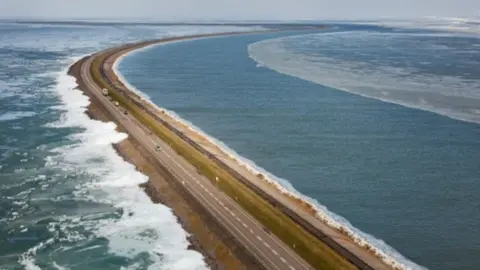The Wash: £2bn tidal barrage plan including road and port unveiled
 Centre Port
Centre PortPlans have been unveiled for a £2bn tidal barrier scheme across The Wash between Lincolnshire and Norfolk.
Developers said the 11-mile barrage, between Gibraltar Point and Hunstanton, could generate tidal energy and protect homes and businesses from flooding.
The project would also include a dual carriageway, container port and could create 1,200 jobs, Centre Port said.
But conservationists have raised concerns about its potential impact on a sensitive habitat for wildlife.
Under the proposals, the company said it wanted to build a "hydro-electric dam" and about 15 tidal turbines under the water to produce enough energy to power 600,000 homes.
Centre Port said it planned to create the "world's first tidal energy-powered deep sea container terminal", which would have the capacity to handle up to four million containers annually.
 Centre Port
Centre PortThe project would act as a flood defence scheme for communities in Norfolk, the Fens and parts of Lincolnshire, protecting against land-side flooding and tidal surges, the company said.
It has won a six-figure investment from energy firm Centrica.
James Sutcliffe, chief executive officer of Centre Port Holdings, said it wanted to utilise The Wash's "tidal area of 780sq km for renewable energy production" and create job opportunities for young people.
He added: "Because we can shut down the turbines, which have sluice gates in them, we can then stop surge tide coming through from the North Sea, like it did in 1953 and 2013, and stop it damaging the countryside and preserving The Wash as it is today."

However, Tammy Smalley, from Lincolnshire Wildlife Trust, said the scheme would prevent some animals, such as seals, from feeding off the coastline.
"You'll lose the birds, you'll lose the seals, you'll lose the fisheries," she said.
"You'll lose habitats that also sequester - capture carbon - like salt marsh. They're more effective at capturing carbon than trees. So it's a wholesale change for wildlife that's highly unlikely to survive."
Steve Rowland, from the RSPB, added: "It's just not needed and it's absolutely bonkers. There's already a Wash shoreline management plan to protect the people in the industries of The Wash."
A planning application for the tidal barrier scheme is yet to be submitted, but a Centre Port Holdings spokesperson said they hoped the project would be operational by 2028 at the earliest, if approved.

Follow BBC East Yorkshire and Lincolnshire on Facebook, Twitter, and Instagram. Send your story ideas to [email protected].
